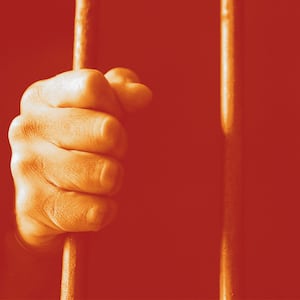Just eight months after the Trump administration invoked an obscure provision of the 2001 Patriot Act to hold him indefinitely, Adham Amin Hassoun is on the verge of taking his first free breath in 18 years, after a federal judge raised “serious concerns about governmental conduct” in the now-junked case against him.
“There’s nothing that tastes better than freedom,” Hassoun, 58, told The Daily Beast from an immigration detention complex at Batavia, outside Buffalo in western New York.
The government conceded in court papers that it cannot prove Hassoun is a threat under the standards set by the judge in the case, Elizabeth Wolford. Late Monday afternoon, Wolford said that Hassoun “should be released on conditions.” Owing to a final government gambit for an appeal, that won’t happen until at least Saturday.
"This case makes clear as day that the government must never be given the sweeping power to imprison people indefinitely in the United States without charge and without a fair hearing,” said Hassoun attorney Jonathan Hafetz of the ACLU, “because if given that power, the government is sure to abuse it."
But Hassoun has heard he would be a free man before. In October 2017, he completed a federal prison sentence for charges of conspiracy and material support for terrorism. (He has denied any wrongdoing,) Instead of releasing Hassoun, however, the administration placed the Palestinian national in an Immigration and Customs Enforcement cell in the frustrated hopes of deporting him. There he has remained for nearly three years, as the administration has intensified its portrayal of Hassoun as a threat to national security, making him the Forever War’s first-ever post-conviction detainee.
That portrayal depended on the word of a prisoner named Shane Ramsundar.
On the eve of Hassoun’s long-awaited evidentiary hearing, scheduled for Wednesday and now scrapped, Wolford found that the Justice Department hid evidence calling Ramsundar’s reliability into question. Ramsundar had leveled allegations against other detainees that were “identical in their essentials” to his portrayal of Hassoun as a dangerous terrorist; had been “formally admonished by the FBI when he previously served as an informant”; and had offered to trade testimony for leniency in his own immigration case. None of that had been turned over to Hassoun’s attorneys.
Exposed, the Justice Department agreed not to rely on Ramsundar anymore. But a “deeply troubled” Wolford wrote in a late Thursday decision that the obfuscation raised “serious concerns about governmental conduct” that was “at the very least sloppy, and possibly intentionally misleading.” Wolford even raised the prospect of imposing “sanctions and/or further relief” against the Justice Department. Her review also junked testimony from two more jailhouse witnesses against Hassoun.
In response, the Justice Department on Thursday filed a motion for a final judgment in Hassoun’s case, throwing in the towel ahead of Wednesday’s scheduled evidentiary hearing. Prosecutors conceded that its “remaining evidence” justifying Hassoun’s indefinite detention “is insufficient to meet the standard set” by Wolford, whom they lamented had “inappropriately raise[d] the [government’s] burden and standard of proof.” On Monday, Hassoun’s lawyers agreed to the government’s request to cancel Wednesday’s hearing.
“As we've maintained from day one, the government has no case. And now it's admitted that in court. Our client should be released immediately," said Hassoun attorney Hafetz.
Now the government will likely appeal Wolford’s decision to order Hassoun’s release, on the grounds that Wolford erred by considering Hassoun’s latest round of detention properly reviewable by a judge at all.
Assistant U.S. Attorney Daniel P. Moar and Justice Department national-security official Anthony D. Bianco requested the court stay any order to release Hassoun for five days in order to permit the government’s appeal. Hafetz wrote that Hassoun’s camp is “deeply concerned that the government’s motion to cancel the evidentiary hearing is merely a gambit intended to keep him in detention while avoiding the further dismantlement of the government’s case and judicial scrutiny of its baseless factual assertions.”
In another twist, the government’s appeal starts with Wolford, who now must evaluate whether her own decision faces an overturn by an appellate judge. On Monday, Wolford set a schedule for filings related to the government’s anticipated order for her to delay Hassoun’s release. The schedule runs at least through Saturday, so if Hassoun goes free, it won’t be until next week.
With Hassoun likely to stay with his sister in Miami, the Justice Department requested Hassoun wear an ankle monitor, restrict his Internet usage, report any contacts who aren’t his immediate family and generally make his freedom conditional. Hassoun agreed to the conditions “to facilitate his prompt release [something that] speaks directly to his intent to live peacefully,” his lawyers wrote in a Monday filing.
“Eighteen years, man,” Hassoun reflected on the phone from ICE detention. “What did I do?”
Hassoun’s now-expired conviction was not for any violent act. It was for writing checks to charities banned after 9/11 for ties to terrorist groups – all but one of those check written before the Patriot Act became law – connecting him to a criminal conspiracy resulting from the Patriot Act’s expansion of material-support dragnets meant to dry up sources of terrorism funding. The judge at his 2008 sentencing rejected the government’s insistence on a life sentence, on the grounds that not even the government contended anything Hassoun did resulted in any harm to another person, and backdated his 15-year sentence to incorporate the six years he had already been in pre-trial detention.
To Hassoun, the prosecution has always been malicious, the result of the government fruitlessly attempting to pressure him into becoming an informant. In particular, they wanted him to testify against co-defendant Jose Padilla, the supposed dirty bomber, whom Hassoun had encountered at a Florida mosque.
“I don’t rat on people. I’m not that kind of person,” said Hassoun, who lived through the Lebanese civil war as a youth and said he presumed his charitable contributions went to fellow refugees in the Balkans, Chechnya and Afghanistan. He recounted an FBI agent telling him, “in a couple weeks, you’re gonna beg us to tell us what we need to know.” Hassoun said he “looked at him and said, ‘Are you stupid?’ You picked the wrong person.”
Hassoun read from a letter he intended to send to the acting Homeland Security secretary, Chad Wolf, the person permitted under the Patriot Act to detain him indefinitely. Hassoun said he wrote it after hearing Wolf discuss the police murder of George Floyd through the detention-center radio.
“The abuse of power is when you round people up with certain beliefs after a tragic event they had nothing to do with [9/11] as criminals and use them as scapegoats simply because you can. You charge them, get them convicted, detain them and after they finish their time, you detain them again,” Hassoun read. “Mr. Wolf, the abuse of power is when you use unfounded fabrications from desperate detainees who seek to stay in this country… when your investigation reveals [the allegations] are all lies and yet you still use them to justify your unconstitutional indefinite detention under the Patriot Act.”
Hassoun’s lawyers kept his case going even as it took a frightening turn. The coronavirus outbreak swept through the Batavia detention complex holding Hassoun. By April 22, according to the immigration news outlet Documented, Batavia was “home to the largest population of immigrant detainees with COVID-19 in the United States.” Current ICE statistics show that 14 others have since surpassed Batavia, but 49 people there have to date tested positive.
Hassoun said that he feared contracting the virus after coming down with a high fever and body aches in February from contact with a sick officer, at the dawn of the outbreak in America. Shortly afterward, Hassoun was placed in separate housing owing to a hunger strike protesting his confinement. He credits the guards at Batavia for “doing the best they can” to enforce precautions like handwashing and quarantining.
Asked what he wanted to say to the America that locked him up for 18 years, Hassoun responded with a minimum of bitterness.
“The United States is a great country. I have a high degree of respect for the Constitution and the people who made the U.S. the way it was before,” Hassoun said. “But there are people who came to power, abusing the trust of their own people and the people who wrote the Constitution.”








